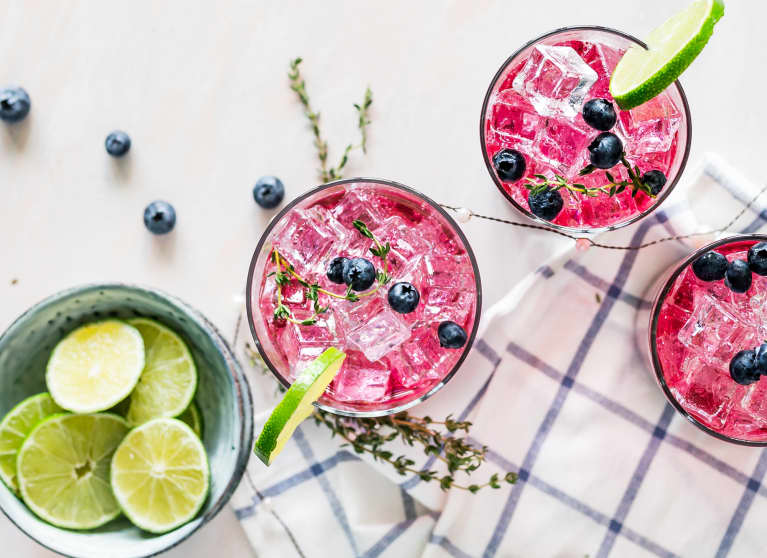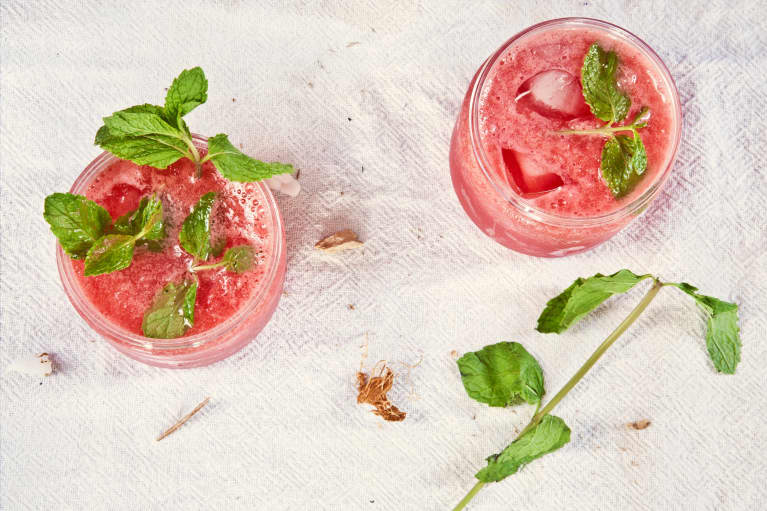Which Types Of Alcohol Are Best For Blood Sugar & Hormones? A Personally Motivated Exploration ( courtecy; By Liz Moody Food Director )-
Which Types Of Alcohol Are Best For Blood Sugar & Hormones? A Personally Motivated Exploration
July 27, 2018 — 9:45 AM
I'm sort of notorious for making bold declarations about quitting sugar around the mbg office. "This is the week," I'll announce to my colleagues, who respond with rolled eyes and the awareness that I'll be back to my 3 PM chocolate within days. Each time, however, sparks a conversation about the rules of a no sugar challenge (a topic of heated debate during last year's site-wide affair)—namely, is alcohol allowed?
It's a sticking point for many people trying to cut back on the sweet stuff, who will happily eschew cake and cookies but throwback three glasses of red during a happy hour. Which raises the question: How sugary is alcohol, really? And why should we care?
If you've experienced that shaky, exhaustion-accompanied hanger, you're likely all too aware that balancing blood sugar and blood sugar-related hormones, like insulin, is key to avoiding the spikes and crashes that lead to these feelings of discomfort. In fact, according to celebrity nutritionist and mbg Collective member Kelly LeVeque, elongating your blood sugar curve is the key to feeling and looking great—and craving less unhealthy food generally.
"Insulin, which is secreted by the pancreas to allow your cells to take in glucose (blood sugar) for energy or storage, prevents fat cells from being broken down," LeVeque says. "When you elevate insulin by eating [or drinking], it can contribute to chronically elevated insulin, insulin resistance, metabolic syndrome, and increased hunger and cravings."
All that said, let's get back to the question at hand: What should you be drinking if you're concerned about blood sugar and hormone balance?
When it comes to blood sugar, not all alcohol is created equal
Turns out, the truth was far more complicated than I thought. Let's start with the basics: Distilled alcohol (meaning vodka, gin, rum, and whiskey) contain 0 grams of carbohydrates and 0 grams of sugar, which means they'll have a negligible impact on blood sugar. Wine and beer, on the other hand, contain sugar and carbohydrates that are processed in your body in a similar way to straight sugar—your blood sugar spikes, your body releases insulin to help stabilize your glucose levels, which leads to a later fall.
Among wine and beer, the amount of sugar differs by the type of drink: Drier wines contain less sugar because the yeast has consumed the sugar naturally present in the fruit during fermentation, while dessert wines, like port, contain more. Interestingly, cheaper wines tend to contain more sugar, because wine makers let them ferment for less time to speed up their route to market, and because the residual sweetness makes the wine more palatable even when its lacking nuance.
Blood sugar is only part of the story, though
Many of us know the effects of a long night of drinking—fitful sleep, waking up in the middle of the night—and blood sugar is definitely one culprit. "If you go out and have a few drinks, then you go to bed and sleep, you're far more likely to wake up in the middle of the night because your blood sugar is dramatically dropping," explains Robert Graham, M.D., an integrative doctor who specializes in the intersection of food and medicine. "You’re waking up because of the hypoglycemia." He recommends mitigating this blood sugar rollercoaster by eating a heady dose of hormone- and blood sugar-balancing healthy fat—not by "soaking up" the alcohol with starchy foods. (Consider this permission to order avocado fries at your next happy hour.)
That's only part of the story, though. "One of the biggest myths about alcohol is that it [always] turns into sugar," explains Graham. "The bigger story is how it's metabolized and [how it can] increase weight gain—which has little to do with sugar."
This process is all about what's happening in the liver. "The liver prefers to metabolize the alcohol before anything else," explains Graham. "That's why doctors will tell you not to have Tylenol at the same time as alcohol; they'll both take precedence in the liver, putting too much strain on it." Because of this, the liver will prioritize the breakdown of alcohol above fats, proteins, and carbohydrates, leading it to slow down the burning of fat, which can contribute to weight gain (FYI in case weight is a concern for you).
So what drink should you choose if you're worried about your blood sugar?
If beer and wine impact your blood sugar, and distilled liquors still affect your liver, what's a social 30-something to do? Graham recommends a hefty dose of moderation—no more than 1-2 drinks for men, and 1/2 - 1 drink for women. From a health perspective, he recommends distilled alcohols consumed neat or with soda water (the mixers typically used are where the real sugars come from). My personal favorite? A high quality vodka or gin, mixed with soda water and a splash of bitters, which up the digestive benefits and add a more nuanced flavor. Lately, I've been loving the new, celeb-favorite Ketel One Botanical line, which are infused with fruit and herb essences in lieu of the more commonly used artificial flavors (the Cucumber & Mint one is heaven served ice cold with seltzer, no extra flavoring necessary).
That said, "I like a fat Cab or the hoppy IPA," Graham laughs. "While it's technically a worse choice wellness-wise, I also think it's important to live life with gusto and not feel guilty. If you want to have something, have a tiny bit of it and close your eyes and really enjoy it. That's what life's all about."
If you do want to make a cocktail, may we suggest these healthier versions?



মন্তব্যসমূহ
একটি মন্তব্য পোস্ট করুন